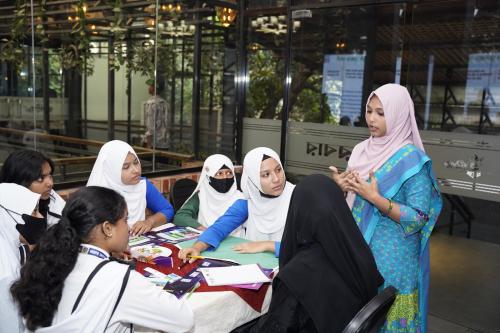Editor’s Note: This blog is a guest contribution from Gabriel Sanchez-Zinny and James McBride, who participated in a Brookings roundtable discussion on the post-2015 education agenda on July 29, 2014.
On July 29, 2014, a group of education and development experts gathered at the Brookings Institution in Washington, DC, to discuss the prospects for—and challenges to—education reform in the post-2015 development agenda.
“Post-2015” refers to the stage following the end of the Millennium Development Goals (MDGs), a set of targets adopted in 2000. As the MDGs expire, there is a debate taking place around how best to proceed, and what will take their place.
The Brookings discussion jumped head-first into this debate, at the center of which is a recent UNESCO position paper proposing the adoption of new global education goals. The proposal consists of 10 targets for education, including the investment of 20 percent of state budgets for education, achieving universal literacy, and increasing the numbers of adults enrolling in continuing education or technical training. UNESCO also suggests 25 indicators that can serve as signposts on the way to achieving these goals.
On hand to discuss and critique the UNESCO proposal, as well as to lead a discussion of possible alternative approaches, was Ariel Fiszbein, a former chief economist for the World Bank and director of the education program at the Inter-American Dialogue. Fiszbein’s remarks highlighted the need to focus first and foremost on quality of education. He argued that the idea of ensuring adequate quality is largely absent from the UNESCO proposal outside primary education, in favor of an emphasis on expanding coverage. To him, getting more children into schools will do little intrinsic good if they are not learning while they are there—and indeed, Fiszbein pointed out that poor quality schools were actually a major driver of poor coverage, since students drop out at greater rates when classes are not delivering any value to their lives.
Another aspect of the discussion centered on how education policy goals fit into the political dialogues of nations undergoing reforms. Countries often resist setting specific targets, as the UNESCO proposal does, because such targets impact the domestic political balance of power between agencies and branches of government.
This is where the issue of coverage versus quality came into play. Clearly, education reform will always be a political process, one embedded in the ongoing negotiations and positioning of the governing coalition. Yet the group agreed that reformers must recognize when the political nature of the process benefits some types of approaches over others. For instance, governments are inclined towards expanding coverage because it supports key constituencies, while reforms to improve quality—such as stricter evaluations and higher standards—challenge the status quo.
As far as the specific targets are concerned, Fiszbein believes that these are “moral benchmarks” that should guide actions for schools, governments, and society as a whole. Education goals should be broad guidelines that focus on ensuring discipline and accountability. But they should also be concise, clear, and intelligible by civil society at large—an area in which Fiszbein feels the UNESCO protocols, with their complexity, fall short.
Given that the UNESCO proposals would not be binding and would influence primarily by inspiring policymakers to action, Fiszbein also proposed more concrete means of measuring the effectiveness of education benchmarks. He suggested conducting nationwide assessments beginning early, with the first or second year of primary school, in order to have a baseline for comparison as students enter the later stages of their education. He argued that references to national standards alone are not helpful. How are citizens to know if the proposed standards are adequate without the benefit of some international benchmarks? If carried out regularly and comprehensively, assessments can provide clear comparisons—and encourage positive competition—between countries, put a valuable accountability tool in the hands of the citizenry and incite governments to action.
The discussion also covered how specific recommendations should be in prescribing the reform process. To some around the table, the UNESCO targets seemed over-determined, not only establishing what the outcomes should be but also exactly how they should be reached—for instance, in requiring that governments spend at least 20 percent of their national budget on education.
Many argue that such specificity on “inputs” is warranted, because governments need to be pushed to commit a certain amount to education. But others argued that the role of the international community should be to determine outcomes only, and let individual countries take whatever route works to achieving those outcomes. In that way, innovation and flexibility can be preserved without sacrificing accountability. Moreover, we know that there is not always a strong link between outputs and inputs: in the absence of effective and accountable school systems, spending 20 percent of the budget on education may be a colossal waste.
Despite its controversies and flaws, the group agreed that UNESCO has made an important contribution in the Post-2015 discussion. Already 70 countries have supported the goals, giving reformers hope that the international community will be able to avoid a lowest-common-denominator approach to standard-setting in education.
The development community has learned that reforms have to be owned to be sustained. Post-2015, change will take hold and learning will improve only if a quality-oriented education reform movement emerges from within national political processes as something to be embraced, not feared.
The Brookings Institution is committed to quality, independence, and impact.
We are supported by a diverse array of funders. In line with our values and policies, each Brookings publication represents the sole views of its author(s).




Commentary
The Need for Quality in the Post-2015 Education Agenda
August 7, 2014